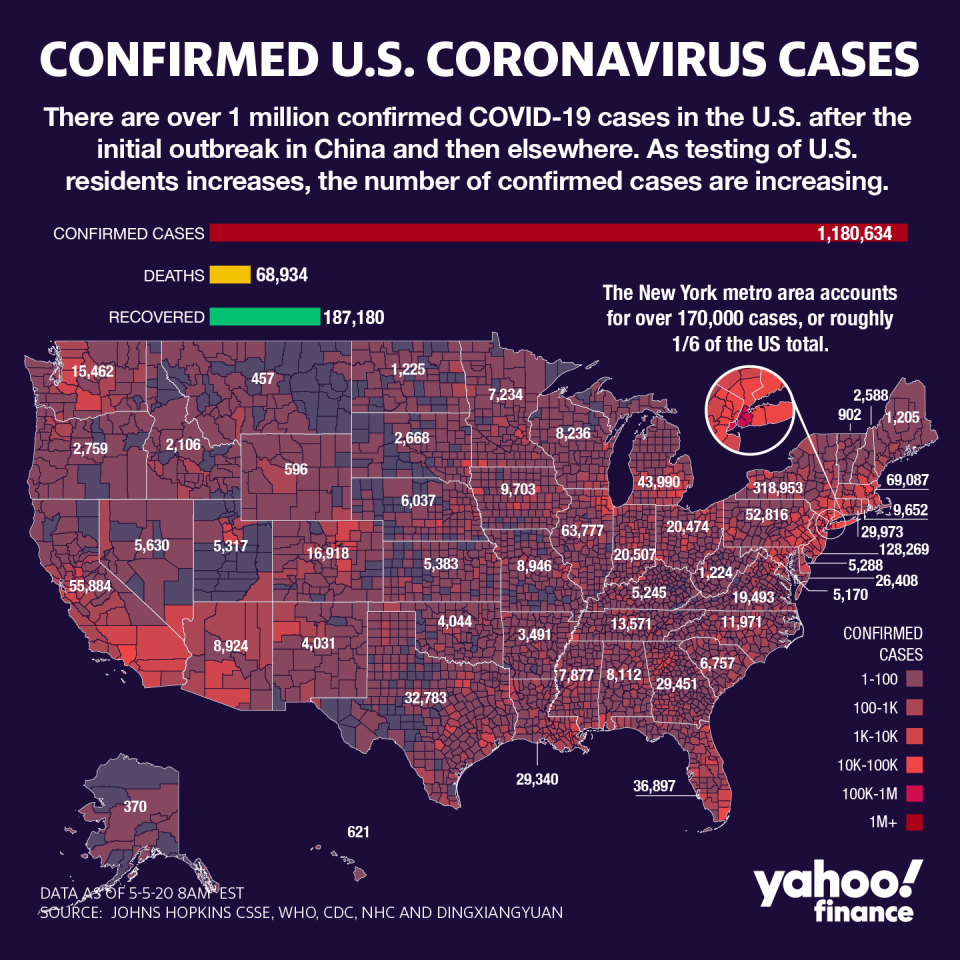Coronavirus update: States slowly reopen as food supply worries grow; Pfizer starts US vaccine trials
A number of U.S. states continued the painstaking process of restarting their economies on Tuesday, even as lack of testing and growing worries over the country’s food supply injected new levels of uncertainty into the effort to manage the coronavirus outbreak.
The global pandemic has now claimed more than 252,000 lives and infected more than 3.6 million. In the U.S., more than 1.2 million cases have been reported — and the toll continues to grow even as state officials debate relaxing restrictions on public movement. The death toll surpassed 70,000 Tuesday.
California Gov. Gavin Newsom announced the state was ready to enter the second phase of reopening, which would allow retail companies like florists, bookstores, clothing and toy stores, to provide curbside or storefront pickup — all while continuing to follow social distancing rules. However, aine-in restaurants, bars, movie theaters and other such businesses are still not allowed to open, he said.
The state is also investing in efforts to ramp up trained contact tracing experts, and will partner with the University of California to provide an online training system. Newsom is redeploying existing state employees as contact tracers, and hopes to train 10,000 individuals to meet the tracing needs of the state.
Meanwhile, despite ongoing increases daily in New York and New Jersey, there are signs both states — which represent the two largest outbreaks in the U.S. — are peaking. Yet Florida, Georgia and Massachusetts continue to climb in daily case counts.
All while the White House is winding down operations for the coronavirus task force, which took the lead— over the country’s health agencies— in centralizing communication of the outbreak over the past few months.
Vice President Mike Pence said Thursday the White House is working on a transition plan with FEMA.
“I think we’re starting to look at the Memorial Day window, early June window as a time when we could begin to transition back to having our agencies begin to manage...our national response in a more traditional manner,” Pence said.

Testing remains a key to easing concerns, and while nasal swab testing capacity has increased significantly. Commercial labs have stated that supply now outweighs demand, but antibody testing has emerged as a new obstacle.
Following reports of inaccurate antibody tests flooding the market, the Food and Drug Administration has required companies to provide proof of accuracy within 10 days, the agency announced Monday.
Meanwhile, more promising news from the pharmaceutical sector came Tuesday as Pfizer (PFE) announced its vaccine candidate, in partnership with BioNTech, began clinical trials in the U.S., a week after beginning in Germany.
The company is ramping up production of the potential vaccine with hopes to have millions of doses ready by September— when it anticipates emergency use approval. The company also said in a statement it is targeting hundreds of millions of doses to be produced in 2021.
In addition, Regeneron (REGN) announced on an earnings call Tuesday that its multi-pronged effort for an antibody cocktail treatment could be ready by fall. Clinical trials will begin in June, and the company is going to have 100,000 doses ready by the end of summer.
Tyson, Wendy’s in the eye of the storm
Meanwhile, the U.S. food supply continues to face pressure as major producers struggle to meet demand amid plant disruptions and sick workers. Over the last several weeks, Krogers and Costco have limited the amount of meat products consumers can purchase to ameliorate supply worries.
On Tuesday, Tyson (TSN) said it was bracing for continued disruptions at its plants as it struggles to implement worker testing and safety protocols. The company has been facing criticism of its handling of the outbreak — and ability to protect workers— with some plants accounting for the majority of cases in some areas.
Just last week, the company issued a dire warning that the food supply chain was “breaking” as COVID-related closures and sicknesses hamper the ability to provide supplies to shut-in consumers. The effect may also cause a depopulation of cows, chickens and pigs.
Separately, disruptions to beef supplies is forcing Wendy’s to make changes to its menu. In a statement to Yahoo Finance, Wendy’s (WEN) said due to production challenges at beef suppliers across North America, the menu of beef offerings will be limited.
And the travel industry remains under dire pressure. Norwegian Cruise Lines (NCL) said Tuesday its future is troubled barring the ability to raise $2 billion in capital. The company is one of the major cruise companies to suffer amid the pandemic, being ordered to cancel routes and provide cash refunds to a swath of customers.
Anjalee Khemlani is a reporter at Yahoo Finance. Follow her on Twitter: @AnjKhem
[Click here for more of Yahoo Finance’s coronavirus coverage: Personal finance tips, news, policy, graphics & more from Yahoo Finance]
Follow Yahoo Finance on Twitter, Facebook, Instagram, Flipboard, LinkedIn, and reddit.
Find live stock market quotes and the latest business and finance news.

 Yahoo Finance
Yahoo Finance 